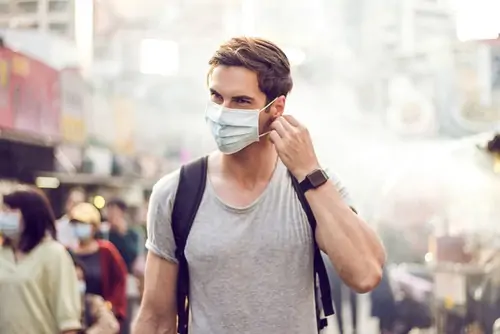
Over the past several months, seeing facemasks everywhere we go has become the norm. For the foreseeable future, these facemasks will continue to be a part of our lives to help stop the spread of COVID-19. But this change in our daily routines can have a side effect that directly involves your dentist in Chapel Hill.
*Up First: A Disclaimer
Even though there are potential ways a mask can affect your oral health, we want to be clear that the following information doesn’t outweigh the importance of continuing to wear a mask in public places. Please continue to wear your mask and use the tips provided to reduce or eliminate the potential risks we discuss below.
Breathing With a Mask
As many of us probably realize by now, we tend to breathe differently while wearing a mask than we do without one. While the mask itself is not to blame for this but rather a change in our habits, it’s important to recognize that changing the way we breathe can affect your oral health. Many people can become mouth breathers while wearing a mask, and while breathing out of our mouths instead of our noses may feel more comfortable, there are some things your dentist in Chapel Hill wants you to know about mouth breathing.
Problems With Mouth Breathing
If you take a few deep breaths in and out of your mouth instead of your nose, notice what happens. Your mouth will probably feel a bit uncomfortable, a little bit dry, and you’ll probably feel like you need a drink. This is appropriately known as dry mouth. Dry mouth occurs when there’s not enough saliva in your mouth to keep it moist. It can happen from mouth breathing or even as a result of some medications. Not only is dry mouth uncomfortable, but it can also cause some oral health problems such as:
Bad Breath
Little to no saliva means that bacteria are allowed to linger around in the mouth. These bacteria will feed on anything they can find and release an acidic, bad-smelling byproduct. The result? You guessed it — bad breath.
Cavities
Without saliva, we know that bacteria are left behind to wreak havoc on our breath, but your dentist in Chapel Hill also knows that a lack of saliva also means a greater risk for cavities. Saliva not only helps wash away bad breath bacteria, but it also helps neutralize acids that, if left alone, could cause cavities.
Tips to Reduce Dry Mouth Risks
Even though dry mouth can increase the likelihood of bad breath or developing cavities, there are easy things you can do to prevent or limit the effects of dry mouth.
If you’re experiencing the discomfort of dry mouth, we welcome you to call our dental office to schedule an appointment with us today. We’ll be happy to help you find relief.